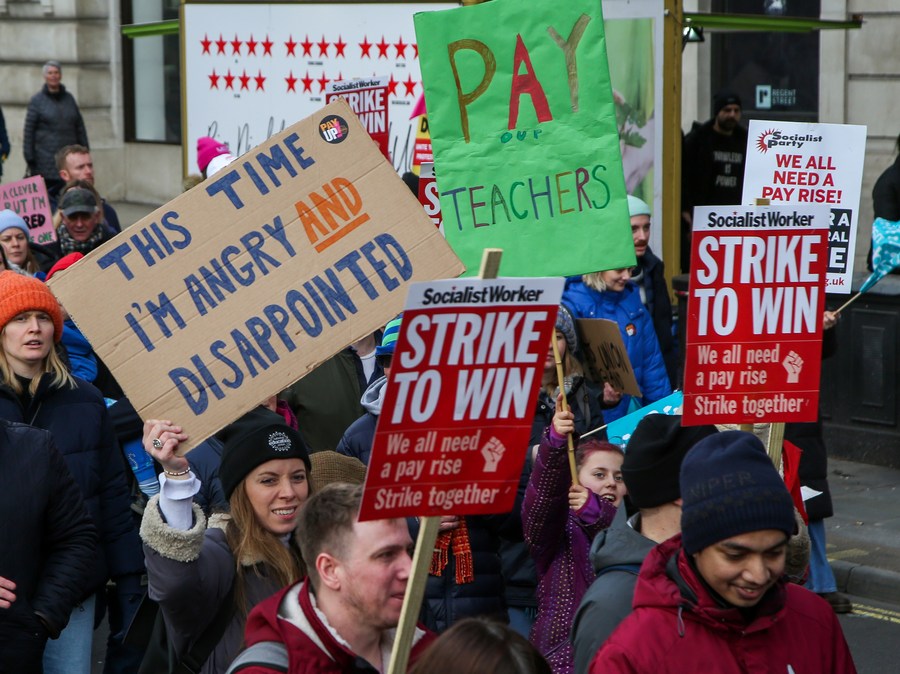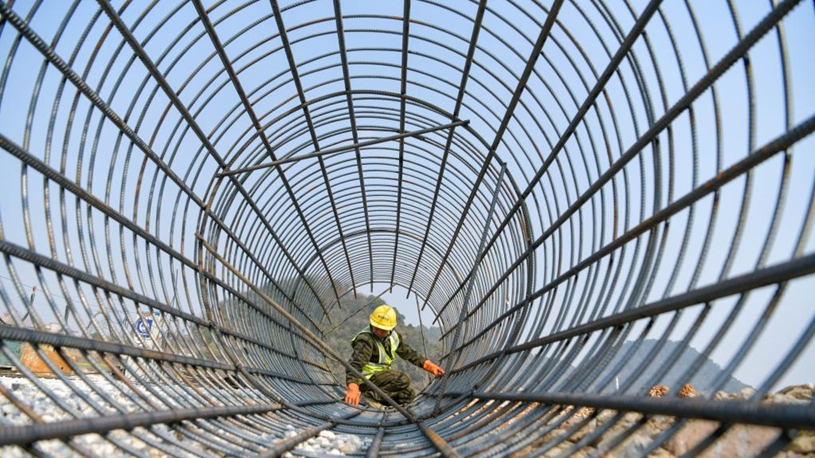
People protest in central London, Britain, on Feb. 1, 2023. (Xinhua)
BEIJING, Feb. 3 (Xinhua) -- A series of large-scale strikes have recently swept through Britain and France, causing widespread social turmoil and large economic losses.
Behind discontent and indignation in the streets are some social maladies which have festered, including the widening wealth gap, impotent governance and persistent neglect of the general public's livelihood.
ESCALATING STRIKE ACTIONS
In Britain, up to half a million British teachers, university staff, train drivers and civil servants went on strike on Wednesday in the largest coordinated action for years amid high inflation and lengthy disputes over pay.
Teacher members of the National Education Union in England and Wales walked out in the first of the several days, affecting 23,400 schools, as they argued that there is a crisis of recruitment and retention within the school system.
"Staff aren't asking for much. They want a decent pay rise, secure employment and for devastating pension cuts to be reversed," said Jo Grady, general secretary of the University and College Union.
Also on Wednesday, around 100,000 members of the Public and Commercial Services Union, employed by over 100 different employers in the civil service, walked out as part of the union's national campaign over pay, pensions and jobs.
Such widespread strike action has not taken place since a dispute over public sector pay in 2011, and according to local media outlets, the latest round of stoppages have left transport networks paralyzed and thousands of classrooms empty.
The large-scale strikes on Wednesday are also expected to take a huge economic toll. Britain has plunged into an effective "mini lockdown" as half a million workers went on strike, and millions of others were forced to stay at home due to the mass walkouts, noted the Centre for Economics and Business Research.
Meanwhile, France saw its second major nationwide strike in two weeks on Tuesday, in a backlash against the government's plans to raise the retirement age to 64.
"The government must hear the massive rejection of this project and withdraw it," Patricia Drevon from the Force Ouvriere union told a joint press conference and was quoted by German broadcaster Deutsche Welle.
The French Interior Ministry said that more than 1.2 million demonstrators took part in the protests across France on Tuesday, surpassing the more than 1 million people who took to the streets during the first round of protests on January 19.
French daily Le Figaro has reported that clashes took place between some demonstrators and police in Paris, and tear gas and smoke bombs were fired.
The day's strikes and protests have severely disrupted school classes, public transport, power plants, oil refineries and others in France, and Air France has cancelled 10 percent of its short - and medium-haul flights for the day because of the strike.

People participate in a protest against the government's controversial pension reform plan in Paris, France, on Jan. 31, 2023. (Photo by Glenn Gervot/Xinhua)
DEEP-SEATED DISCONTENT
Although the strikes in Britain and France are different, they have shown that financial problems, including record-high inflation, pay disputes and a further widening gap between rich and poor after the COVID-19 pandemic, are greatly impacting Europe.
Over the last year, Britain has seen record-high inflation. The consumer price index rose at an annual rate of 10.5 percent in December, and the cost-of-living crisis continued as food inflation remained historically high, official figures showed.
Meanwhile, wages have failed to keep up. When adjusted for inflation, real growth in total and regular pay fell by 2.6 percent on the year from September to November 2022, among the largest declines in growth since comparable records began in 2001, the British Office for National Statistics revealed.
The strikes aren't just about wages, but bigger questions including economic fairness, said an opinion article published in the Washington Post on Thursday.
Steve Roskams, an archaeology lecturer at the University of York who was on a picket line, said lecturers' pay had declined by 25 percent compared to other sectors in the last 10 years, and many young lecturers were on casual contracts which gave them no job security and made it difficult to get mortgages.
"The huge gap between the rich and the poor is growing," Roskams was quoted by British media outlet The Press as saying. "The situation is not sustainable."
The government had repeatedly said that meeting striking workers' demands was unaffordable, but it could easily raise billions of pounds by charging banks more, and levying a windfall tax on energy companies, Roskams added.
Similar grievances have spread among protesters in France, where reform plans seek to solve the pension problem by extending the retirement age.
To fill the deficits caused by the shrinking worker-retiree ratio in the coming decades, the French president wants everyone to work longer, reported the Financial Times.
It is a burden that weighs more heavily on people who start work at a younger age and those with physically challenging jobs, it said, adding that the president also set out red lines that companies would not be asked to pay higher taxes, nor would current retirees, even the wealthier ones, be asked to contribute.
Francois Ruffin, a member of parliament for the Somme region and a prominent figure in the leftwing Nupes alliance, told media that the billionaires have only gotten richer since the COVID-19 pandemic, arguing that the president "refuses to tax windfall profits made by our biggest companies, and somehow all the effort to fix the pension problem must fall on the shoulders of workers?"
"This is a moment to fight for the kind of society we want -- not one where capital crushes labor and people are just consumers," Ruffin noted. ■












